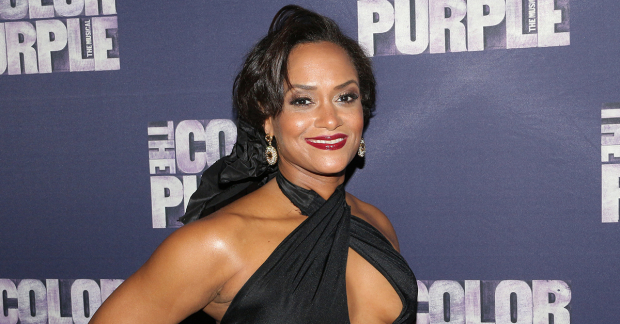Broadway's Rema Webb Blazes a Trail Alongside Fannie Lou Hamer
Webb plays the late civil rights activist in one of the first shows to be performed in the tristate area since the theaters shut down.
Broadway knows Rema Webb from productions like Violet and The Color Purple, and now audiences will get to know her as a trailblazer. For five performances, October 15-18, Webb will play the pioneering civil rights activist Fannie Lou Hamer in the Premiere Stages at Kean University production of Cheryl L. West's Fannie Lou Hamer, Speak on It! At the same time Webb will blaze a trail of her own, becoming one of the first actors to perform in a theater piece in the tristate area in seven months. It's a huge responsibility, and one that Webb doesn't take lightly.

(© David Gordon)
How familiar were you with the live of Fannie Lou Hamer before you took this project on?
I was pretty familiar with Fannie Lou Hamer because I was born during the tail-end of the civil rights movement. My siblings, who were 17 and 19 years older than me, spent time in the middle of the movement. To even further my connection to Miss Hamer, my mother is from New Orleans, and her father was from Mississippi. Growing up, I spent almost all of my summers and holidays in New Orleans; Pearlington, Mississippi; and Ocean Springs, Mississippi.
So for me, her name and important work was celebrated in my home and community as long as I can remember. She, along with leaders like Dr. King, Medgar Evers, Reverend Andrew Young, Shirley Chisholm, were staples in my household and of church community conversations and debate.
What was the most interesting — or moving — aspect of Hamer's life that you learned in this process?
During this process, the most interesting aspect of Miss Hamer's life that touched me was the fact that she was 44 years old when she began her civil rights work. That she didn't let the narrative of her being a treated as nothing more than a slave her entire life define her spirit. It's amazing and intriguing to me that she beat back her life's traumas. She actually used trauma to feed her drive and commitment to better this world. She was brilliant, resilient and had an extremely empathetic heart.
I'm also in awe of her commitment to women. All women, regardless of race or socioeconomic status. She was inspired by the suffragist movement, and was obsessed with bringing all women together under one Women's Movement. Unfortunately, to this day, there's still nothing of the sort. Imagine the influence and power if all women (of multiple races, ages, and economic backgrounds) became united.
Why is Fannie Lou Hamer's story important to tell right now?
Her story is important right now because in 2020 we are once again experiencing a civil rights movement. Once again experiencing everything for which she fought. It's surreal that during rehearsals when I speak her words I can't differentiate whether or not I'm in 1962 or 2020.
What is it like putting together a theater production in the time of Covid?
Putting together a theater production during Covid has been challenging, and a blessing. I say challenging because these are extraordinary times that involve extraordinary ways to navigate our lives, to navigate this production. That being said, personally, I've made the decision to be as flexible as possible. We have to Covid-test twice a week, be away from family and friends in order to quarantine, and rehearse outside only from morning to evening. And yet, I feel so blessed to be experiencing the process of creating this show, to tell this story, using my talents.
This is one of the first shows in the tristate area to be performed since theaters shut down. Do you feel an added pressure knowing that you could help show the world that it's possible to safely make theater now?
Although this is one of the first shows on the tristate area, I don't feel added pressure in being on the forefront of helping to make shows safer during these extraordinary times. It feels more like an honor to have a chance to be committed to doing what I can for our industry. Rules and precautions are made to keep everyone as safe as possible, while trying to foster quality art. However during this process, I've found that some logistics probably have to be more thought-out for future productions. The key is for everyone to stay as flexible and communicative with actors, production teams, our unions, producers, general managers, and audiences as much as possible.







